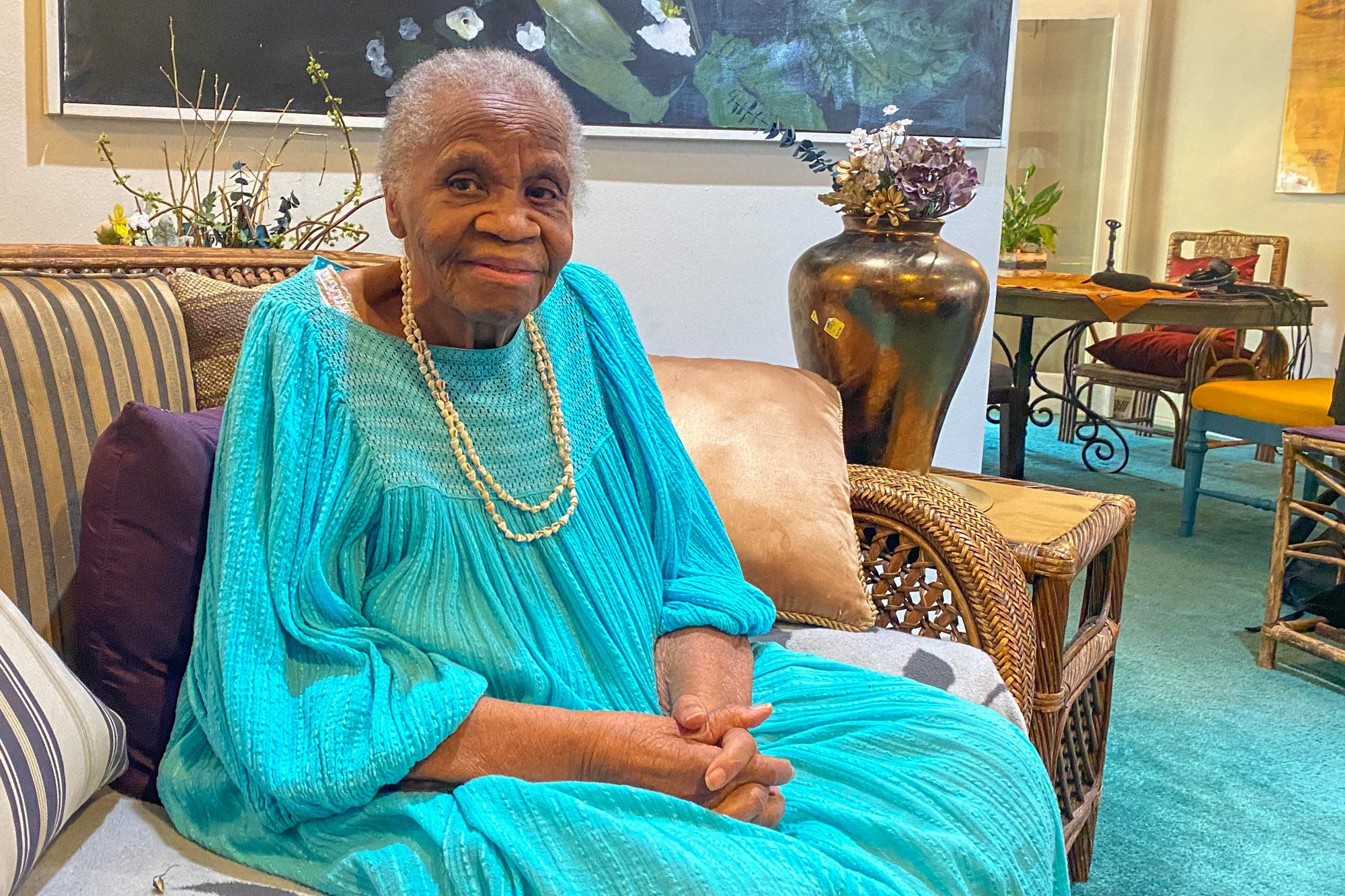
President's Day celebrated earlier this week officially honors the nation's first president George Washington. It also commemorates past US presidents.
One Denver historian views the nation's presidents through a unique lens. Gwen Scott will be 95 next month. She spent most of her career teaching US history in the Denver public schools. And, she became interested in the impact past presidents had on Black Americans. Scott co-wrote a textbook back in 2010 called "Blacks Through the Ayes of Our American Presidents."
Colorado Matters reporter Andrea Dukakis visited Scott at her home in Denver to talk about the book—and included the presidents who came after the book was published.
This interview has been edited for clarity and length.
Andrea Dukakis: Let's talk about some of our presidents and their stance toward Black people in America, ones that may have had a positive influence and others that have had a negative influence. I want to start with our founding father, George Washington. Talk about his approach to Black people during his presidency from 1789 to 1797.
Gwendolyn Scott: Well, George Washington was the prototype of racism. The first five presidents, they're all in the same category. Yet, at the same time, they were talking about “all men are created equal,” etc. and etc. When you see what documents they signed with the Constitution, Black folks aren't even people or three-fifths of a person. So [...] those first five presidents—from Washington to Monroe—[...] they were not in Black people's corner.
Dukakis: We should say that George Washington himself was a slave owner.
Scott: Four of the five were slave owners. Adams was the only one that was not a slave owner.
Dukakis: Abraham Lincoln, our 16th president, has a controversial legacy. He's credited with ending slavery with the Emancipation Proclamation, but you've said it's obviously more controversial than that, the idea that had he not been assassinated, his legacy might be quite different.
Scott: Yes. After all, when you think of a period of time that this was the formation of the country and the attitude toward Blacks was nothing more than they're livestock. I might add that Frederick Douglass is the one who was in there that was instrumental in changing some of Lincoln's attitudes toward Black people.
Dukakis: Frederick Douglass, an activist who spoke throughout the states about emancipation and African American rights.
Scott: Yeah, but in the beginning, when Lincoln took office, he said slavery was a part of the business and he felt that there was no way in this country that whites and Blacks could be together. In fact, the White Citizens' Councils used Lincoln's quote in their propaganda.
Dukakis: Talk about the controversy over Lincoln's legacy, how many people have viewed him over time and how much of the view about him is changing?
Scott: Once they understand what the Emancipation Proclamation said, that all slaves are free that are in the states that had become a part of the Confederacy because Kentucky and Tennessee still had slavery. So did Maryland and Delaware, but they were not in the Confederacy. They were free only because they were in the Confederacy, so he did not free the slaves. He said he wasn't freeing the slaves. He was there to save the Union, which he did.
Dukakis: So the Union was his priority, not emancipation.
Scott: No, not at all. That was not it. He matures quite a bit because he's the first president that allows a Black person into the White House. That's Frederick Douglass, and Frederick Douglass has a great deal of influence.
In fact, the last paragraph of the Emancipation Proclamation says he would even consider these Blacks who fought for the Union to become citizens. Of course, that led to his assassination since Booth was sitting in the audience at the time when he made that proclamation. That was the aegis for John Wilkes Booth. He said no, they won't be citizens over his dead body, so he made up his mind to assassinate him at that point.
Dukakis: Booth, of course, Lincoln's assassin.
Scott: Yes.
Dukakis: It's impossible to predict what would've happened had Lincoln not been assassinated, but what do you see that might have changed that view of him as someone who was receptive to African Americans at the time?
Scott: Well, it's hard to tell. It depends on who the historian is, plus the fact that you saw him grow. He comes in as a man of his time when slavery is the whole picture of American society.
There is another factor, though, in his coming up. His father was more of a slave driver, too, and there was an indication supposedly somewhere in the reviewing of Lincoln's background, that he had a sympathy about slavery because of the way his father treated him like a slave. This may have been part of the growth area that, in his reflection of his own life, and then to see those Black people in that same condition forever, that's maybe a part of the change in his desire to be a little more humane about those people that are out there treated like livestock.
Dukakis: Let's jump forward to Franklin Roosevelt, the nation's 32nd president from 1933 to 1945. He presided over World War II. How would you describe his legacy in terms of Black Americans?
Scott: There's another case. Black people, for the first time, got attention from the White House. You could say they were even naming their kids Roosevelt. Jackie Robinson's middle name is Jackie Roosevelt Robinson. This is also the time that Black voters are changing from the Republican party to vote for the Democrats because the Democrats were always those Southern Confederates.
When Roosevelt came into office, it happened to be that the country was in such an array that most of the people were poor, so this was depression time. It was by default that Black people were able to be there right at the same time to get some of the benefits of the New Deal. It was nothing directed directly for Black people in the New Deal.
He was not really in the corner of Black people, but it was his wife. If it hadn't been for Eleanor, in fact, every time she would come in and he would ask her, "What in (bleep) do you want now, Eleanor," she would say so and so and so, so a lot of the things that were done for Black people was because of Eleanor.
Dukakis: Did Roosevelt own up to the fact that his wife was a huge influence on him?
Scott: I don't think so. He was such an egoist, I don't think he gave Eleanor credit. She was really the strength about humanity and she could see the damage that was being done. Well, Second World War gives you a picture. This was the time of Hitler, the time of the Japanese and Mussolini, those dictatorships in Russia. Then the Communists are beginning to develop, so this is a fight for democracy at this point. That's a big battle.
Dukakis: Moving on to Kennedy and then Johnson, a southerner who took over after John Kennedy was assassinated. Talk about their legacy.
Scott: Well, there's another misconception about who's in your corner. When Martin Luther King was jailed in Birmingham, Coretta appealed to Kennedy to keep him from being sentenced to, I guess, a period of time was supposed to be something like three to four or five months. She was very fearful that if he went into one of those Georgia prisons that he may not come out again, so there was an appeal made to Kennedy. Kennedy did intercede so Martin Luther King was released, but Kennedy was really not a real civil rights fighter at all.
Dukakis: Can you give me an example of why he wasn't?
Scott: Well, he had other things. This was a time when you're trying to make America not get enchanted with Communism, so this is that part of America, although the civil rights movement was beginning to really gain steam. Emmett Till becomes a symbol for Black people to gather together to say, "We're not going to take this stuff anymore."
Dukakis: A boy who was murdered.
Scott: In Mississippi, yes, and the year before was the Brown decision.
Dukakis: Brown vs. Board of Education.
Scott: Yes, which nullified the Jim Crow segregation that ruled the United States.
Dukakis: What you're saying is, for Kennedy, civil rights was not necessarily his priority.
Scott: Not at all.
Dukakis: Talk about Johnson's legacy. He was a southerner, of course.
Scott: Johnson was not a wealthy man. He grew up as a poor Texan and he had taught Mexican kids. He saw what poverty did there. Texas, at that time, was segregated obviously, so he was not in a school with Black people, but his grandfather was one of the people in Texas who fought against the Ku Klux Klan. He had that in his background.
Then, of course, when he was first in Congress as a representative and then he becomes a senator, he's still in that whole Dixie crap kind of mentality. As things go along and the country is beginning to see the damage that Jim Crow has done, plus the fact there is the television so the people throughout the country can see what's going on with the brutalizing of Black people. As a true politician, you take advantage of what is out there to help keep you in power.
I do think that Johnson was sincere because he [...] was a Democrat and those Democrats from the South, they were dyed-in-the-wool Black haters. They were still in that Confederate mold, but Johnson was able to persuade some of them to see the wrong that was being done. It was miraculous. Johnson was responsible for the voter's rights, fair housing. That is foremost on Johnson's Great Society hit list.
Dukakis: There are a lot of presidents in between, but I want to move forward to the nation's first Black president. How do you view Barack Obama, his election and what it meant for Blacks in the U.S.?
Scott: Well, when Barack Obama was elected, why, Black people couldn't believe it. In fact, I couldn't believe it. I never thought there would be a Black president in my lifetime. There would be a white woman before a Black man.
This phenomenon happened and Black people were ecstatic, but many Black people were disappointed because when he went into office he didn't devote his administration to Black problems. He tried to explain, "I'm the president of everybody," that he couldn't just concentrate and do problem-solving for only Black people.
Dukakis: As a Black woman, how did you see his decision to focus on the entire country and not just Black citizens?
Scott: I could understand, but many Black people, they think this is the Messiah and he's going to devote all his energies and his strength to be... I guess he would be an ultra-modern Lincoln in Black skin and he would free the Black people. Blacks, at this time, were just coming out from under Jim Crow so their concern is that, "At last, we're going to get everything we wanted. We're going to get reparation. We'll get land. We'll get all these other kinds of things that were denied us, Black people, throughout the years."
Barack Obama, his job was to govern for everybody. Yet, at the same time, he did a considerable amount in appointing Black people in strategic positions, bringing the information that allowed the health legislation to go through, which Black people really profited from. He also had a great influence on Black people voting. In those southern states, particularly, Black people began to vote because they think that was proof that Obama, as our Messiah, came to the rescue.
Dukakis: Now some people see Donald Trump's election as a backlash to a Black president before him. Do you think Trump's election was partly racism rearing its head, white people not being happy with the fact that a Black man was elected president?
Scott: Well, it was just the consummation of what white people were thinking a long time ago, especially starting with Richard Nixon. See, after Johnson's Great Society, and he begins to give Black people their due, their rights, why, then one of the euphemisms that Nixon uses is Middle America, which means this is white folks, and we're going to take back our country, what later becomes the mantra for Donald Trump Taking America Back.
Dukakis: Of course, many see Trump sowing the deep seeds of racism in this country, particularly the Ku Klux Klan March in Charlottesville and what happened after that. Can you talk about Trump's response to that?
Scott: Trump didn't sow the seeds. All he did was cultivate them and make them full-blown because Trump becomes their Pied Piper. You notice that the Ku Klux Klan no longer comes out in robes and peaked hats. They are right out front. Then all these other hate groups come out, too, the Proud Boys, the Oath Keepers. They are waiting in the wings to be released and when Trump says the right things, he's their guy.
Trump had a record. Look what he did on Obama, busy talking about Obama's birth. He knew all the "facts" that Obama was not an American. He was a... oh, you know what the story was.
Dukakis: Is there an American president that you think did the most to change life for Black people in this country or can you not name someone in particular?
Scott: Without a doubt, it was LBJ. Johnson is the only president that directed most of his administration to try to right the wrongs that went against Black people all these years.
Dukakis: Gwen, thanks so much for talking to me.
Scott: Well, it's been my pleasure. I hope there's some enlightenment here.
Related stories
- Frederick Douglass On How Slave Owners Used Food As A Weapon Of Control
- Obama: ‘The Story Of America Is The Story Of Progress’
- The New Deal And Its Great Gains For Southern Colorado









